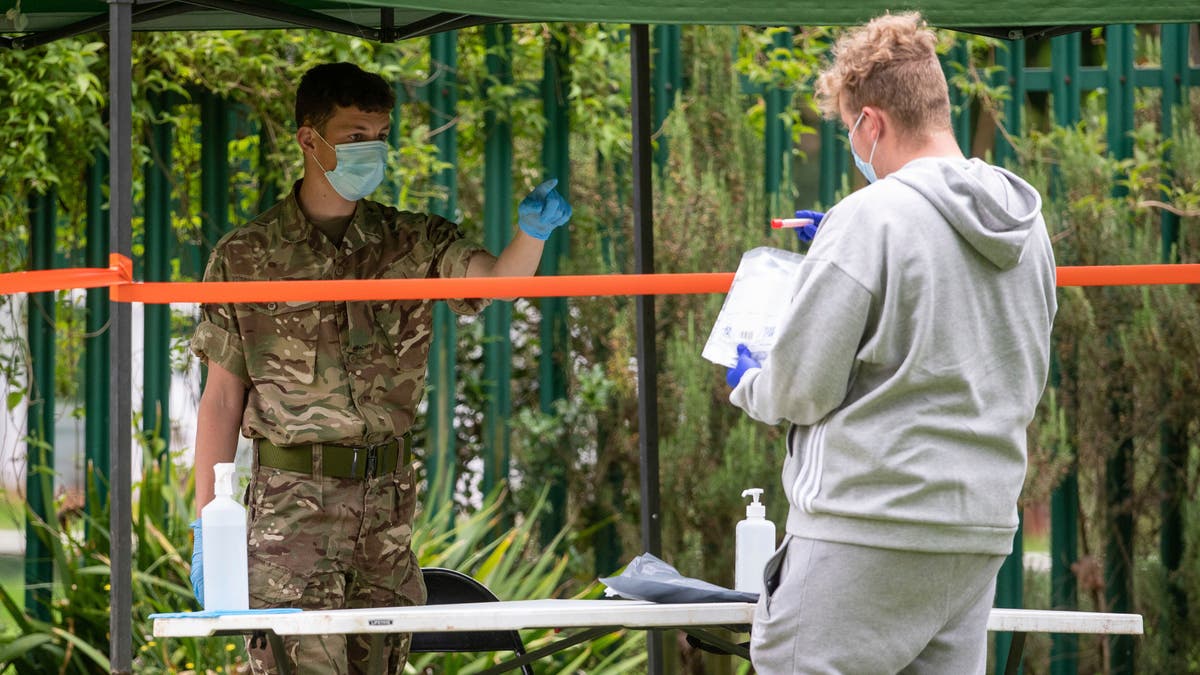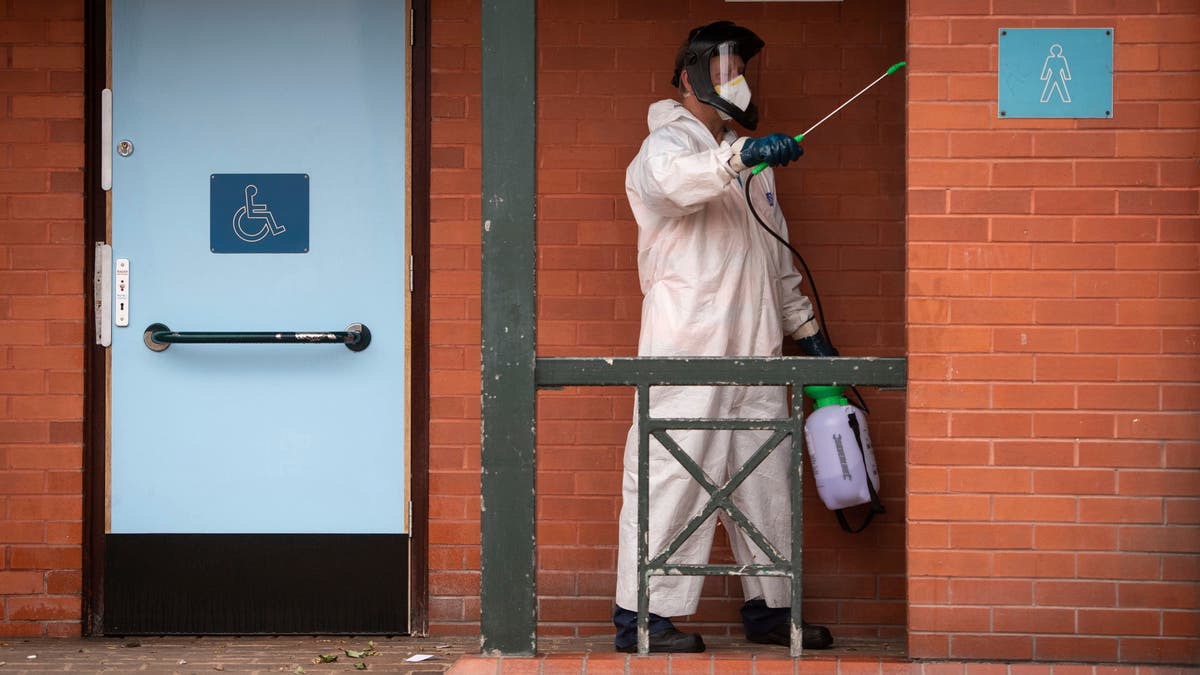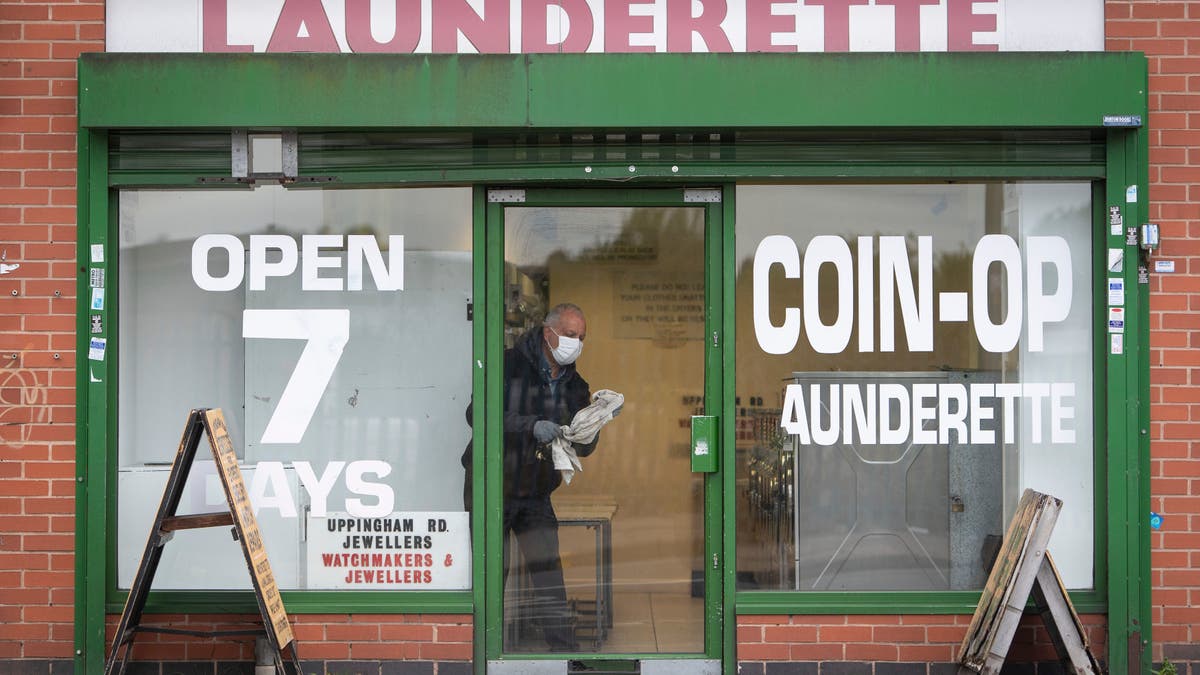Azar says 'window closing' to halt coronavirus spike
Is it too late? Fox News medical correspondent Dr. Marc Siegel weighs in.
The British city of Leicester is forcing its stores and schools – some of which just reopened two weeks ago -- to shut down once again in hopes of containing a new coronavirus outbreak.
The reintroduction of restrictions on the city of 330,000 people came as British Prime Minister Boris Johnson promised an infrastructure investment plan to help the United Kingdom fix the economic devastation caused by the pandemic.
Shops in Leicester selling non-essential items — most things apart from food and medicines — were ordered to close starting Tuesday. Schools, which have been gradually welcoming children back, have to send them home on Thursday and residents are being told to make only essential journeys.
CLICK HERE FOR FULL CORONAVIRUS COVERAGE

Members of the military operate a walk-in mobile COVID-19 testing center at Spinney Hill Park in Leicester, England, on Monday. (AP/PA)
“I opened my shop last week for the first time and saw an instant increase in orders and now I worry this change will go back to no orders,” James West, who runs a design and printing company in Thurmaston, just outside Leicester, told the Associated Press.
People in most of England will be able to drink in pubs, eat in restaurants and get a haircut when the next phase of lockdown-easing measures begins Saturday. However, the government has rolled back those freedoms in Leicester, saying that the city 100 miles north of London accounted for a tenth of all new coronavirus cases in the country last week.
"The strategy is to allow for the opening up of the rest of the country, giving people their freedoms back where it is safe to do so," U.K. Health Secretary Matt Hancock told Sky News on Tuesday. "But we also need alongside that to take local action where there is a specific flare-up."
"That's why we took the decision, with a heavy heart, it has to be said, to close schools in Leicester and in Leicestershire [county]," he added.
BORIS JOHNSON VOWS ‘ROOSEVELTIAN APPROACH’ TO UK CORONAVIRUS RECOVERY

A man disinfects public toilets in Leicester on Monday. (AP/PA)
The U.K.’s official death coronavirus death toll stands at 43,659, the highest in Europe and the third-highest in the world after the United States and Brazil. The country's infection rate has been falling though as Britain is gradually easing lockdown restrictions imposed in March.
Local officials have accused the U.K. government of being too slow to act in Leicester, an industrious, multicultural city with two universities and factories making shoes, clothes, and potato chips. They said a rise in local infections had been evident for almost two weeks, but the central government had not shared the data promptly with public health authorities in Leicester.
Leicester Mayor Peter Soulsby said “we have not as yet been able to give satisfactory answers” about where the outbreak was concentrated, but that officials were starting to get fuller data to piece together the picture.
“There are some clusters of cases that have been found in some places of work,” he added, amid reports of outbreaks at some of the city's many garment factories.
THOUSANDS FLOCKING TO ENGLISH BEACHES TRIGGER ‘MAJOR INCIDENT’ RESPONSE

Leicester has accounted for a tenth of all new coronavirus cases in the United Kingdom last week, the government says. (AP/PA)
The city has a large south Asian community who often live in multi-generational households that can transmit the virus between family members.
Yet Bharat Pankhania, an expert on infectious diseases at the University of Exeter, said it was too early to know whether the outbreak was linked in this case to race or other factors.
“I don’t think there is anything peculiar about Leicester,″ he told the Associated Press. “Time will tell... it will happen in any large city with a lot of people and a lot of people circulating.″
Meanwhile, the U.K.’s Office for National Statistics said Tuesday that the U.K. economy had contracted by 2.2 percent between January and March, slightly more than first thought. The period covers only the first week of lockdown.
“It may seem premature to make a speech now about Britain after COVID,” the prime minister acknowledged Tuesday before doing just that -- promising to pump billions into schools, roads, rail systems, and housing. He called the plan a “New Deal,” echoing the policies of President Franklin D. Roosevelt that helped wrench the United States out of the Great Depression.
CLICK HERE TO GET THE FOX NEWS APP
In a wide-ranging speech, Johnson promised that “we will build better and we will build greener but we will also build faster.”
“The virus is out there, still circling like a shark in the water,” Johnson added.
The Associated Press contributed to this report.


